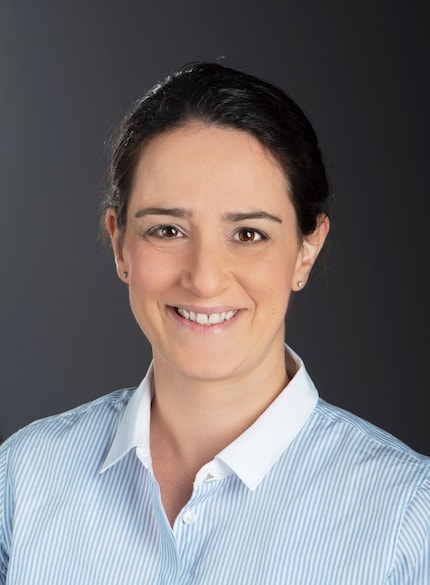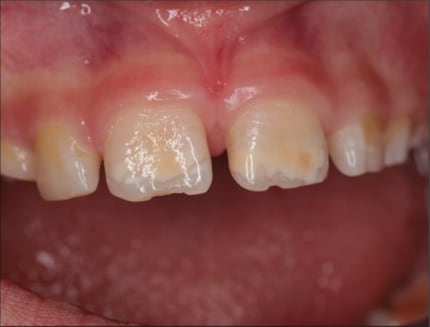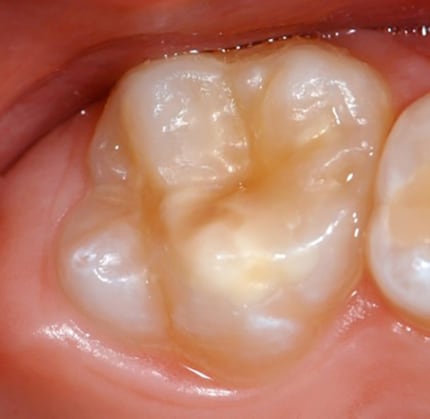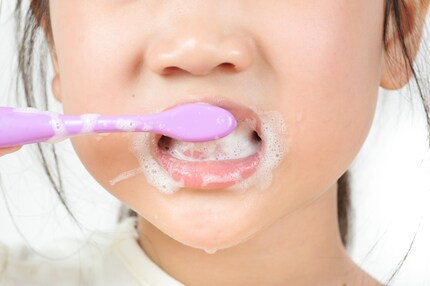
Background information
Help, so many children have braces!
by Martin Rupf

Parents of children with chalky teeth are often worried and have many questions. I’m no different in that respect. To get answers, I spoke to an expert.
When our five-year-old daughter had a dental checkup in the spring, we were relieved. No tooth decay, no cavities. But as is often the case, the good news was followed by bad news: Zoe has chalky teeth. Oh dear, not her, too. I’d recently read an article in German about the rise of chalky teeth in children.
This means the days of Zoe’s sticky bubble gum toothpaste are numbered. Since finding out about her chalky teeth, we’ve been brushing them with a special children’s toothpaste recommended by the dentist. It has an increased fluoride content to strengthen the tooth enamel. We also brush her teeth with a special fluoride gel once a week. Zoe hates it, but we’ve got to bite the bullet together.
So chalky teeth have been on my mind for a while. I want to learn more about the condition and set out to find a specialist. The SVK (Swiss Association for Paediatric Dentistry) (page in German) leads me to Eirini Stratigaki. She’s a senior physician at the UZB, the clinic for paediatric and adolescent dentistry (page in German) at the University Centre for Dentistry Basel.

What exactly are chalky teeth?
Eirini Stratigaki: chalky teeth are crumbly due to weaker enamel. The medical term for this is molar incisor hypomineralisation (MIH). Affected teeth may be discoloured and more prone to breaking. They’re also often very sensitive to heat, cold, sweets or touch. It’s precisely this sensitivity that can cause children to be afraid of going to the dentist.
Some of our daughter’s milk teeth are chalky. Will her permanent teeth inevitably be affected too?
There is a risk of that happening. Milk teeth and permanent teeth don’t all grow at the same time. If the back milk molars are affected by MIH, it’s more likely the first permanent molars will also be affected as they form at around the same time. According to studies, the risk is 50 per cent in those cases. If a child has no chalky teeth in its primary dentition, the risk is around 15 per cent.

How serious are chalky teeth?
It depends. While some children only have slight discolourations, others have teeth that break shortly after erupting. Sometimes it’s only the first permanent molars and incisors that are affected, but milk teeth can be, too.
What causes chalky teeth?
It’s still unclear what the cause of chalky teeth is. However, experts now agree that a combination of predisposition and external influences is responsible for the development of chalky teeth. The last months of pregnancy and the first years of a child’s life are decisive, as it’s when most of the permanent teeth are set and formed. Potential risk factors include complications at birth, early childhood illnesses, vitamin D deficiency or pollutants in the environment.

What can you do about chalky teeth?
There are many different ways to treat chalky teeth – whether they’re milk teeth or permanent. Your dentist will create an individual treatment plan together with you and your child. The plans are tailored to the severity of the condition and the age of the child. A treatment plan includes both short-term measures to relieve pain as well as medium- and long-term strategies to keep the teeth stable. These days, there are precise instructions available from international specialist groups to provide the best possible treatment for chalky teeth. The greatest challenge during treatment is the pain sensitivity of affected teeth. This makes early diagnosis and gentle treatment particularly important.

My general impression is that chalky teeth have increased significantly in recent years. I get the impression that an increasing number of children have them. The condition is sometimes even referred to as a «new widespread disease» (link in German). Can you confirm this?
It does seem that chalky teeth are becoming more and more common. However, this is probably not because there are more cases, but because we’re more likely to spot them these days.
What do you mean?
In Sweden, chalky teeth were focused on for the first time in the late 1970s and early 1980s. At the same time, tooth decay was decreasing, putting chalky teeth in the spotlight. This created the impression that the condition was on the rise. However, archaeological investigations actually show that chalky teeth have probably existed much longer. These days, dentists are better at spotting chalky teeth and telling them apart from tooth decay. As a result, they’re diagnosed more frequently. What’s more, tooth decay is still going down thanks to better dental care, which draws even more attention to chalky teeth.
I'm a full-blooded dad and husband, part-time nerd and chicken farmer, cat tamer and animal lover. I would like to know everything and yet I know nothing. I know even less, but I learn something new every day. What I am good at is dealing with words, spoken and written. And I get to prove that here.
Interesting facts about products, behind-the-scenes looks at manufacturers and deep-dives on interesting people.
Show all